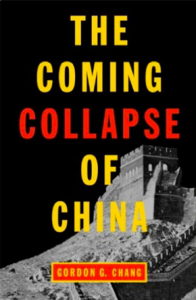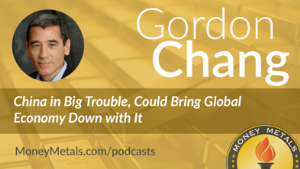To Listen to the Podcast Audio Click Here
 Mike Gleason (Director of Money Metals Exchange): It is my privilege now to welcome in author, lawyer, television pundit, and Forbes columnist Gordon Chang. Gordon is a frequent guest on Fox News, CNBC, and CNN and is one of the foremost experts on the Chinese economy and its geopolitics and has written a book on the subject called The Coming Collapse of China.
Mike Gleason (Director of Money Metals Exchange): It is my privilege now to welcome in author, lawyer, television pundit, and Forbes columnist Gordon Chang. Gordon is a frequent guest on Fox News, CNBC, and CNN and is one of the foremost experts on the Chinese economy and its geopolitics and has written a book on the subject called The Coming Collapse of China.
Gordon Chang: Thank you, and it’s a real honor to be on your show.
Mike Gleason: Before we dig into some specifics here, Gordon, China’s economy is now the second largest in the world. They’ve been reporting GDP growth at 7% to 10% per year for decades, and we’ve all heard stories about their booming economy. But few Americans have been there and probably don’t really know what’s going on. The Chinese government is notorious for managing statistics and controlling information, so it can be difficult for U.S. investors to get the real story. That’s why we’re very excited to get your insights today. You’ve spent time in China, you are of Chinese descent, and you’ve been studying their economy for decades, so you have a unique perspective on what is really happening there.
So to start out here, talk about the current state of the Chinese economy as you see it and where it might be headed. As people listening have probably already gathered, based on the title of the book you wrote, you aren’t all that optimistic about what’s going to happen there. Tell us about that as we set the stage here.
 Gordon Chang: The official National Bureau of Statistics says that the Chinese economy grew 6.7% in the first quarter of this year, 6.9% in 2015. I think that those numbers are over-statements. So for instance, in Q1 they might have been growing 3% or 4%, but maybe even less than that. In 2015, it was a tragic story because you start looking at some of the indicators, you see the contraction of the important manufacturing sector. You see consumption growing a little bit, but not that much.
Gordon Chang: The official National Bureau of Statistics says that the Chinese economy grew 6.7% in the first quarter of this year, 6.9% in 2015. I think that those numbers are over-statements. So for instance, in Q1 they might have been growing 3% or 4%, but maybe even less than that. In 2015, it was a tragic story because you start looking at some of the indicators, you see the contraction of the important manufacturing sector. You see consumption growing a little bit, but not that much.
And still, the most reliable indicator of Chinese economic activity is the consumption of electricity, and in 2015, electricity consumption grew but only by 0.5%. The country was in deflation in 2015 with nominal GDP at 6.4% and real at 6.9. That’s really difficult to reconcile with an economy growing in the higher single digits. So I think China has got a problem right now because essentially, Chinese leaders no longer have the ability to create growth. This is an economy that’s trying to trend down, and eventually, it will start to contract.
Mike Gleason: The Chinese have made some large trade deals with nations such as Russia and Brazil to buy oil and gas and make payments in yuan rather than U.S. dollars. In addition, China is growing its reserves of both gold and silver. Now you told me off-air that you don’t think a currency war is something China should even consider engaging in based on all of their economic issues, but you have to wonder if they’re trying to position the yuan as an alternative to the dollar nonetheless. Heaven knows, there may be an opportunity there.
The U.S. dollar looks less and less like a bastion of strength. Kenneth Austin, an economist at our own Treasury Department, wrote a 2014 op-ed in the New York Times declaring that the burden of the dollar’s reserve currency status is one we can no longer afford to bear. Maybe a currency war won’t be necessary and officials here will willingly step aside. What are your thoughts? Should we expect a major push by China to supplant the dollar with the yuan any time soon? Maybe it will be a failed attempt, but is that something they’re positioning themselves for, Gordon?
Gordon Chang: Well clearly, the Chinese want the renminbi to be the world’s reserve currency. They’d like to shove the dollar aside. The problem, though, is that it is a weak currency right now. Donald Trump might be right that they’re currency manipulators, but they’re not manipulating the currency down to gain an export advantage. What we have seen, especially since August of last year, is that they are supporting their currency.
So this is a problem for China because the last thing that they should be trying to do right now is to internationalize the renminbi. And the reason is when they internationalize it, they start to lose control over it, and that’s exactly the wrong strategy when you have an economy in distress. They have had a lot of money, and they’ve lost actually a lot of money out of their reserves, much more than I think that they’re willing to admit. This is the wrong thing for them to do, at least at this particular time.












Leave A Comment